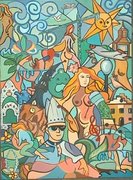Here is the lyrics of the song entitled "Burka" by the famous cantautor Pedro Guerra:
Pies que no pueden hacer ruido al andar,
mujeres condenadas tras el velo,
dedos que no pueden escribir ni contar,
labios que no pueden sonreír ni cantar.
Brazos que no pueden recibir ni abrazar,
mujeres condenadas tras el velo,
mentes que no pueden decidir ni pensar,
ojos que olvidaron el placer de mirar.
Muertas en vida,
dolidas del alma,
personas heridas,
mujeres fantasma.
Pasos encerrados sin unir ni venir,
mujeres condenadas tras el velo,
letras denegadas sin nombrar ni decir,
besos que no alcanzan labios donde existir.
Vidas que no sacian ni el amor ni la sed,
mujeres condenadas tras el velo,
rejas que eliminan cuanto se quiere ver,
burkas enrejadas, libertad tras la red.
Muertas en vida,
dolidas del alma,
personas heridas,
mujeres fantasma.
I cite this song in connection to an article which appeared in the newspaper El Mundo entitled "The burka arrives in Spain". Like the song, a very prejudiced, biased article which really criticises and condemns the apparently barbaric, backward practice of covering oneself in the 21st century because apparently it goes against the current trend of show-it-all; skin is in; the more u show, the more liberated you are...I do not deny that there are alot of women who would probably take off the burka if given a choice without any kind of pressures- society, male folk, conditioning etc.. Just look at Afghanistan.. but then again, there are still women who apparently continue to wear it despite the apparent freedom to remove it..some might say its out of custom, fear, tradition..maybe.. During the war between Algeria and France, women fought to keep the veil on against the french orders to remove it..in Turkey, women doctors and other students, forced to remove it, also demand their rights to wear it... i think its unfair to cast all the apple in the basket as rotten just because one or two are! Some women- and i´ve met some- actually feel better being covered and feel more secure of themselves to express their opinions and socialise in public etc.. Is it right for the outsider to look at them and say they are all oppressed because they arent dressed like normal women? Women wear the hijab for so many reasons..i think we need to overcome this first obstacle of judging them simply by what we see on tv and read about... i do not deny that it is a complicated topic because a sacred book is involved and "reason" apprently seems useless in any kind of debate..but that does not mean that individual freedoms must be violated either..
i also acknowledge the fact that burqa is different from what is currently referred to as hijab- just the head covering as opposed to the burqa which is a full gear with the face covered...the debate centred around the two is obviously different. In my country, Trinidad and Tobago, of catholic majority, you also find women in the streets, almost totally covered and in black.. in the university there too, you find a few as well.. having spoken with some of them, i was assured that this was their choice- one of the girls came from a non-practising muslim family- and wasnt married or anything- because they felt safer and less harrassed by unwelcome gazes.. although it may be difficult for many to understand, i think one individual wishes, as long as it doesnt affect or encroach on anybody else´s rights and freedoms, should also be respected.
Subscribe to:
Post Comments (Atom)

No comments:
Post a Comment